 Help
a Child! Help
a Child! |
STREET CHILDREN CENTERS NETWORK: FORUM
FORUM started their activities on 23- December-
2000
President: Epimaque Kanamugire (TUBAKUNDE)
Vice president: John Nyirimanzi (ABADACOGORA)
Secretary: Robert Makuta (GATENGA)
Treasurer: Daniel Huri (E.P.R.)
CENTRE PRESBYTERIEN D'AMOUR DES JEUNES ( C.P.A.J
)
TUBAKUNDE CENTER
FIDESCO CENTER
GATENGA CENTER (to be updated)
MAISON DE LA JEUNESSE (to be updated)
BUREAU SOCIAL DE KIGALI (to be updated)
RAFIKI (to be updated)
I - CENTRE PRESBYTERIEN D'AMOUR DES JEUNES (
C.P.A.J )
 
CONTACT DETAILS :
CENTRE PRESBYTERIEN D'AMOUR DES JEUNES
Munezero Clementine
B.P. 56 Kigali - Rwanda
Fax: 576929
Tel: 08526061 or 573789
E-mail: epr@rwandatel1.rwanda1.com
E-mail: clementine20002000@yahoo.com
Nom du compte / Account name: EPR Enfants de la
rue
Numéro de compte / Account Number: 10112-06-91
Nom de la Banque / Bank name: B.C.D.I Kigali
INTRODUCTION
The Presbyterian Church of Rwanda (E.P.R) was founded
by the Germans in 1907, and became an independent
national organisation in 1956.
THE PROGRAMME

Our aim is to work together to alleviate the existing
serious problem of children living and working on
the street.
E.P.R, through it's programme "Help the vulnerable
street children", is determined to create a
realistic and effective solution to the problem
of street children. We seek to stem the rapid rise
in the number of children on the street by helping
them to find work and a place in society. We wish
to introduce changes that will continue for generation
to come.
In response to the needs of the street children,
E.P.R opened a centre for them in KICUKIRO, known
as "Centre Presbyterien d'Amour Des Jeunes"
(C.P.J) ,which literally means "the Presbytérian
Centre of love for the young" The centre has
been in operation since 1998.
OBJECTIVE
CPAJ's overriding objective is to support the social
and economic re-integration of street children.
We do this at the centre at Kicukiro by:
-Sending many street children to primary and secondary
school.
-Providing skills and vocational training for older
children and young people who have been marginalized.
This group, who live and work around a dump in Nyanza
are too old to go back to school.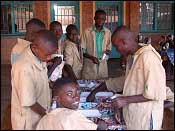
Through these two groups the centre interacts with
young people from the districts of Kicukiro, and
Kigali urban.
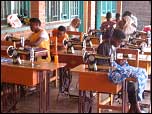
Over the years, Rwandan children have faced many
problems caused by poverty, the genocide of 1994,
irresponsible parents, delinquency etc.. The plague
of AIDS has further exacerbated the problem leaving
many children orphaned. These children therefore
face daily problems of homelessness', poverty, unemployment
and life without their families. In order to re-
integrate them back into society the centre provides
training in various trades and crafts, referred
to as artisan training.
Many of the street children at C.P.A.J are enrolled
into primary and secondary schools. All the children
receive HIV/AIDS education, and wherever possible
we assist with family reunification. We also have
45 boys residing at the centre.
Table
of Areas of Reintegration
ACTIVITES
Our objectives during this year were to establish
the following activities:
- Primary and secondary education for street children
- Artisan training for young adults who are able
to continue their studies.
- Agriculture and animal breeding programmes
- Sensitisation to the struggle and prevention against
AIDS
- Art therapy and psychosocial support
- Interaction with increasing numbers of street
children
- Reintegration of street children back into families
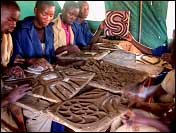
RESULTS
Primary education
This year CPAJ were able to enrol 88 children into
primary school. The centre supplies school frees,
uniforms, materials and medical care for these children.
In general, the children well in school - this year
around twenty of our pupils were among the highest
students in their classes. Now they are 8 who passed
exam official to go to high school. This summer
holiday all primary school children visited different
families. They learnt many things how living in
family. This is a good experience because very soon
some from them will reintegrate the care families.
Secondary education
This year CPAJ has supported 15 young people through
secondary school. The centre supplies school fees,
uniforms, materials and the necessary equipment.
The young people have worked hard, and two boys
have successfully completed their official examination
"du tronc commun". In the holidays the
young people participate in the life of the centre
by working with the primary school children, greeting
visitors and dealing with correspondence.
Artisan Training
For the last two years the centre has offered training
in different trades to the young people who are
unable to attend school. The training lasts for
six months during which they learn their chosen
trade or craft. The group, which began in March
2001, completed their training on 15th September
2001. Today the centre has 100 youths who follow
a artisan formation in different groups include
metal work, making furniture from cartons, baking,
hairdressing salon for boys, crochet and embroidery,
making leather goods, traditional painting and their
the creation of different objects from candles.
We like to encourage the use of recycled materials,
which can be found at the dump in Nyanza. This training
take six months after the youths reintegrate into
families.
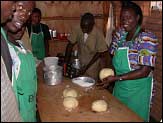
The young adult's background and lack of education
inevitably meant that we faced problems with discipline
and their inability to concentrate and follow lesson.
We therefore established a literacy programme to
combat this problem.
Other activities include agriculture, rabbit breeding,
sports and leisure activities. As a Christian centre
we like to encourage the spiritual development of
the young people through reading the bible and worship.
The young people are given small amounts of pocket
money which they can use as they wish.
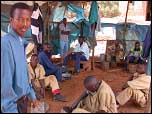
We like to encourage them to use the skills they
have acquired to become self sufficient. We also
monitor and follow their progress once they leave
the centre and offer advice and/ or assistance whenever
necessary.
Animal Breeding and Agriculture
Animal breeding and agriculture are important aspects
of the life and work of the centre. In our field
we grow sweet potatoes, maize and vegetables, which
we use for food and to generate income. We also
give the families who look after children in their
homes a goat as a means of support
AIDS Seminars
During the school holidays the centre holds seminars
to discuss the struggle and prevention of HIV/AIDS.
These have proved quite successful and benefit both
the centre and the neighbourhood. The seminars help
the children / youths to gain a better understanding
of the problem of HIV/AIDS. We also encourage the
children / youhts to be HIV tested, which most are
willing to do. We aim to make the children and youths
sensitive to the suffering the disease cause. The
centre has set up an anti- AIDS club with the objective
of sensitisation. It is important that we continue
with this programme, focusing on the struggle against
HIV/AIDS, as it helps not only the young people
but also all of Rwanda face this issue.
Art Therapy and Psycho- social support
The majority of children and young people living
on the street face ongoing family and social problems,
which lead to psychological and social difficulties.
We offer support and assistance to those who need
it. A trained art therapist and counsellor is available
so that the children can work through their problems
and receive the help they need.
Interaction with Streets Children
The doors of the centre are open everyday. One member
of staff is staff is allocated to visit and interact
with children on the streets, some of whom eventually
join our centre. It is not always possible for certain
young people to join alternative centres.
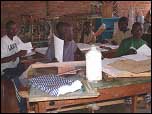
When the children and young people first arrive
at the centre they receive orientation training
to help them understand how the centre functions.
A good relationship soon develops between the new
and the older members, with the latter helping the
former to adapt to the life of the centre.
Reintegrating the youths / children into families
The children who have completed their training courses
continue to have a relationship with the centre.
They either stay at the centre or are reintegrate
into families known to the centre, so that they
no longer have to live on the streets. There can
often be difficulties reintegrating children who
come from districts or provinces far from Kicukiro.
Also the centre does not have sufficient means to
support other young people whose organisations cannot
hold them. The centre assumes an obligation to find
a placement for the young people until they become
self - sufficient.
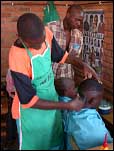
After the centre's first year of training the boys
and girls attempted to earn money by using the skills
the had learnt. This was done through breeding goats,
cows and hens, rebuilding family homes, metal work,
embroidery and baking. Five associations were formed,
two of which still function today.
Each year the centre invites the young adults from
the first year of the CPAJ programme to participate
in church services in order to relay their experiences,
answer questions and offer guidance to new members.
SITUATION FAMILIALE DES ENFANTS
- LA PAUVRETE FAMILIALE
- CONFLITS DANS LES FAMILLES
- ORPHELINS DU GENICIDE
- ENFANTS CHEFS DE FAMILLES
- ENFANTS QUI ONT PERDUS LEUR FAMILLE
- IRRESPONSABILITE DE CERTAINS PARENTS
- SURPOPULATION QUI CAUSE L'EXODE RURAL
PROJECT SUMMARY
To ensure the social and economic reintegration
of street children.
Table
of objetives
CONCLUSION
"Le Centre Presbytérien d'Amour des
Jeunes" announced that they would undertake
the task of assisting street children and young
with social and economic reintegration
Unifortunaly the centre is not able to give assistance
to all the street children who ask for help as it
does not have sufficient means to meet the needs
of the increasing number of children. However, the
centre always strives to attend to their basic needs.
The centre would like to thank the organisations
and individuals both near and far, who have helped
us to establish the activities we have been able
to offer in the year 2001.
II - TUBAKUNDE CENTER
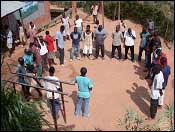
Rwanda, being one of the poorest countries of the
world due to interrelated and complex socio-economic
factors including the 1994 war and genocide and
natural calamities, a large portion of the population,
especially children, are victimized by social evil
like poverty, diseases, lack of education and family
instability. All of these impediments lead to many
unaccompanied and orphaned children in the country. |
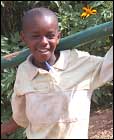
A considerable proportion of these children work
on street with some totally living on street with
out any adult care and protection. In doing menial
jobs for supporting themselves or their siblings,
those children face danger of getting into accidents
and violence. They get exploited and abused and
many are forced to drop out of school or never get
the chance to be enrolled at all.
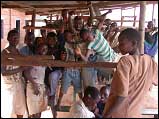
Lack of access to basic primary education is one
of the main barriers that a great number of school-aged
children are encountered in the country. The majority
of the orphan urban children are not attending schools
and their number is increasing from day to day due
various reasons like high cost of school material,
school fees in public and private schools, etc…
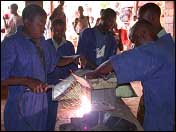
Realizing the complex nature of the problems faced
by street children, particularly in Kigali, Rwanda
capital city, Save the Children Denmark(Red Barnet)
in collaboration with Tabarabana ASBL has initiated
Tubakunde Center which is an integrated community
based child focused program.
The major component of Tubakunde programs are: Advocacy
and Public awareness raising on Child Rights Protection
, Basic Education (literacy, numeric, functional
life skills and skills training) for out of school
street children of 7-18 years and to help those
children to enhance their responsibilities and take
part in wide community development.
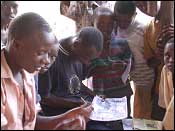
Tubakunde Center is a child oriented organisation
which works for the well being and the respect of
the rights of urban disadvantaged children in general
and street children and youth in particular.
It has been carrying out an advocacy of Child Rights,
providing 158 street children with marketable and
practical skills and Education comes as one to address
the basic education rights of urban disadvantaged
children and youth.
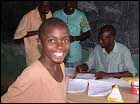
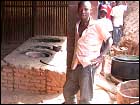

Tubakunde2 Center is a community based training
Center, which is aiming at assisting orphans street
children and youth in Kigali City. It was initiated
in September 1998 by save the Childred Denmark
(Red Barnet) in collaboration with Tabarabana,
a local NGO
The project has three main objectives
- To promote knowledge and understanding in the
community of the UN Convention of the Rights of
the Child
- Basic Education for street children of 7-18
years in literacy, numeric and life skills for
normal school system reinsertion and skills training
for their integration into wide society
- Promoting the psycho-social well-being among
the beneficiaries, enhancing their responsibilities
and take part in community development.
The assisted children and youth are currently
living in and on streets, in order to support
themselves and their younger siblings to be self
reliant into wide society.
III - FIDESCO CENTER
CONTACT DETAILS:
FIDESCO RWANDA
B.P. 1457 KIGALI
Tél.: (250) 512155
Fax : (250) 82716/87261
Email : fidescorwanda@yahoo.fr
No Compte / Account Number: 040-0042083-18
Banque de Kigali, Rwanda.
2 Tubakunde is a Rwandan word and means
"Love them".
THE RUGAMBA PROJECT TO REINSERT THE KIDS FROM
THE STREETS WITHIN THE SOCIETY OF RWANDA
OBJECT :
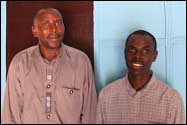
FIDESCO RWANDA is an association according to
the Rwanda Law, issued by FIDESCO INTERNATIONAL,
a branch of the catholic "Emmanuel Community"
settled in France. The aims are to support small
development projects in several countries everywhere
in the world.
The "Rugamba project" started in 1992
with a few natives, founders of FIDESCO RWANDA
who wanted to "do something" for those
kids starving in the streets of Kigali…with
their own means : their heart and their time…
As soon as in august 1994 the project was able
to start again thanks to several benefactors :
- private gifts
- the Belgian Red-Cross
- the Jesuit Community of Remera
- the Office of Rheinland-Pfalz, Rwanda 
LOOKING FOR FINANCIAL AND HUMAN SUPPORT
Up to now, beside an important alimentary supply
from the Catholic Relief Service (guaranteed up
to 2005), and a few one-off allowances, the survival
of Rugamba depends entirely from private gifts
and often voluntary human help.
We are proud of our results, especially in the
numerous concrete outcomes on the so-called reinsertion
field, but we want to do better. This will clearly
never be possible if we do not get any new outside
financing.
The following page presents a new agricultural
training project for 20 kids … and the financial
support needed to achieve it.
BRIEF DESCRIPTION OF THE PRESENT PROJECT (see
annexed document 1. for details)
ADDRESS : CENTRE CYPRIEN & DAPHROSE RUGAMBA
BP. 1457 - Kigali ph: 87261
OBJECTIVES :
To offer to a limited number of boys of the streets
from Kigali (presently 50 residents and 40 to
be reinserted) a chance to be reinserted within
the rwandese society.
MANAGEMENT :
The board of FIDESCO RWANDA, having approved the
annual budget and the strategic positioning, delegates
the running of the project and the financial control
to a restraint executive staff , which includes
the executive manager of the Rugamba project.
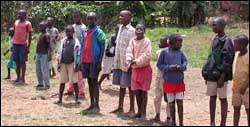
Referees :
- François-Xavier Ngarambe, Predident of
the executive committee
- Jean-Marie Twambazemungu, President of FIDESCO
& delegate to the executive committee
- Albert Kayigumire, General manager of the project
- Emmanuel van der Bruggen, advisor (address in
Belgium : Sparrenlaan 63, 3090 Overijse. Phone
:
02/657.98.10)
PRESENT POSITIONING
1) Contact in open field with a certain number
of those kids where they live
2) Transitional welcome in a shelter of up to
50 of them, at their request, to prepare their
reinsertion
3) Reintegrate them within a reasonable time
either, and preferably, within their family or
in another place where they will get any chance
to integrate
4) Insure them a follow-up up to a maximum of
three years.
ANNEX 1.
MORE DETAILS ABOUT THE RUGAMBA PROJECT
1. Contact in open field
Places : sector of Remera, but also downtown and
in other suburbs of Kigali.
Approach :
- regular attendance
- show them some interest and affection, take
part of their games…
- proposal of activities : films, talks, lectures,
sports…
- invite them to have a meal in the shelter and
wash their clothes…
- have individual listening with those who accept
- in some cases guidance to immediate reintegration
from the street (see point 3.)
- more often directing to a transit stay within
the shelter (…)
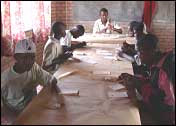
Human resources : one salaried person + one-off
volunteers…
2. The welcome shelter
 |
Place : Site and scantly equipped buildings
are given at disposal (present capacity =
50 beds). |
Outset investments and working expenses (water,
electricity, repairs…) are being token into
charge by the "Emmanuel Community" and,
therefore, do not appear in the running reports
at this stage.
Quite important investments to be done to improve
kitchen, accommodation capacities, sanitary facilities…
Acceptance conditions : as nobody is able to answer
to any need, we put the following limits for a boy
to be accepted at Rugamba.
- The demand has to be issued by the boy himself,
and supported by the responsible person of the contacts
in the open field.
- The boy will clearly adhere the "charter"
of Rugamba, i.e. :
His desire to be reinserted at least within the
two years
His trust in the capacity of the welcome team to
answer to his needs
His acceptance of the disciplinary rules of the
centre
His desire to prove sociability and tolerance to
the team as to his fellow mates.
- The age : between 8 and 18 years old
- The absence of basic hazards that would run reinsertion
to a failure (matters such as the absence of any
remaining family relationship or the existence of
very serious mental or physical deficiencies are
particularly delicate).
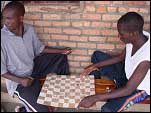
Objectives : to supply a decent but basic welfare
to up to 50 boys, every day and hour of the week.
As the aim remains to prepare their reintegration,
this welcome has to be transitional.
(1) Fulfil the primary needs (food & beverage,
housing, clothing, personal hygiene, medical care,
security)
(2) Insure professional and intellectual education
according to the capacity of each boy (alphabetisation,
scholarship, basic professional learning…)
… and the material means of the project.
(3) Guarantee human rights, especially freedom,
peace and justice.
(4) Try to give some love to everybody to show he
is "somebody", particularly through personal
contacts.
(5) Supply some entertainment, in and outside the
centre, but also make sure to leave enough personal
leisure time when wanted.
(6) Prepare reintegration (see here below).
Human resources : present
1 executive manager
1 administrative employee
1 social assistant
2 educators
1 cook
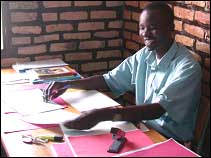
3. Reintegration and follow-up
Preparation :
Most of the time will the job be initiated by the
staff in charge of the contacts in open field. As
soon as the boy visits the centre, will the reunification
staff take over.
His action will first be carried through private
talks as to initiate confidence, collect information,
sound out motivations…
In the same time will he start a long tracing job
and prepare his family to look for his return…
Effective reinsertion :
Will thus be carried out either directly from out
the open field, or after a transit stay (maximum
2 years) in the centre.
It will be achieved when a boy has really quitted
the streets to start "a new life" within
his original environment or another one that will
give him a better chance to luck.
Each project will most of the time be supported
by some one-off incentive (clothes, part of school
expenses, leasing money for a field or a house,
purchase of some tools or building material or even
cattle, …)
Follow-up :
During three years will each boy have regular contact
with the Rugamba team and, if needed, get further
help in his own reinsertion project.
Sometime we do re-accept one of them in the centre
for a very short time… Sometime will one of
them go back to the street. Temporarily… or
definitely…
Human resources : one salaried person
COOPERATE WITH OTHERS
Many humanitarian organisations, either local or
international, assured or not to get financial and
human support, try to cope with the problem of the
kids from the streets and do indeed a very good
job.
We do not only look to get some support, we also
initiated very soon a certain number of contacts
with a large part of them. Those meetings urged
us to act as a pressure group against the civil
authorities as to show how fundamental our action
was for the future of Rwanda.
We are now looking for further synergy in the training
of our staffs, professional learning and reunification. |

